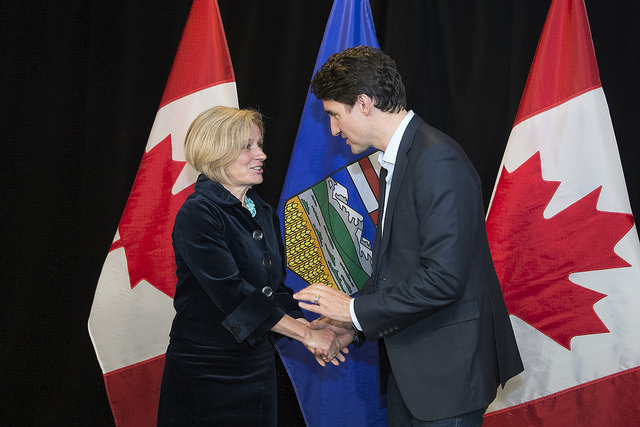In a serious blow to Kinder Morgan’s Trans Mountain pipeline project, Canada’s federal court of appeal ruled today that the pipeline cannot proceed with construction due to a lack of consultation with First Nations.
In their ruling, the court stated that the Canadian National Energy Board’s [NEB], “process and findings were so flawed that the Governor in Council could not reasonably rely on the Board’s report; second, Canada failed to fulfil the duty to consult owed to Indigenous peoples.”
What appears at the heart of the decision is that while Kinder Morgan undertook consultation with concerned communities, the consultations did not lead to any real meaningful changes in the plan. In other words, First Nations leaders felt they were paid lip service over their concerns raised about important issues like how risks to our freshwater aquifers would be mitigated in the case of a spill.
At a press conference held after the decision, Coldwater Band Chief Lee Spahan said that, “they [the NEB] can say they consulted but they never ever ever got our consent. Our fight is about our aquifer, the very importance of water.”
Just 30 minutes after the court ruling was announced, Kinder Morgan Canada shareholders voted 99.98% in favor of approving the sale of the Trans Mountain pipeline to the Canadian government. This is a move that will no doubt be heavily scrutinized in the days that follow.
But even more scrutiny will be heaped on Prime Minister Justin Trudeau, who turned what was a longstanding controversy in Canada into a complete and utter quagmire.
Trudeau was elected with a majority government only a few short weeks before the historic Paris Agreement climate change accord was to take place. An accord that would see global leaders for the first time stand together and (arguably) take real steps in reducing global greenhouse gas emissions that are the root cause of our warming planet.
With his charismatic Minister of Environment in tow, the Prime Minister was a breath of fresh air at the Paris climate talks, bringing a much-needed sense of enthusiasm. I know, I was there and saw first hand a rejuvenated Canadian government committed to doing its part to battle climate change after a decade of rule under Stephen Harper who barely admitted there was a problem in the first place.
I was proud to stand as a Canadian at those talks. It seemed we were finally on the right path.
But now here we are just shy of two years later, and Trudeau is now out front and centre in support of a pipeline project that will not only lock in millions of tons of new greenhouse gas emissions for a generation, but also put British Columbia’s coastal waters at risk and disenfranchise First Nations communities, many of whom were also bolstered by Trudeau’s words on the environment and as importantly on the PM‘s commitment to a truth and reconciliation process that was long overdue.
So what happened? And where do we go from here?
It is clear (at least to me) that Trudeau and his government tried to played politics in a very ham-fisted way. There is an illusion out there, one that I have heard many times, that in order for a Prime Minister to win, he or she must pull in the moderate conservative vote with a pro-oil, pro-pipeline stance.
To win Alberta over, the financial sector on Bay Street, and those with more conservative views, the Prime Minister and his staff made the calculation that a strong stance in favour of the Trans Mountain pipeline would win the Liberals votes from the right, while a pro-climate stance would keep the moderate left in check.
This was a big miscalculation, and Trudeau may pay the price at the polls come next year.
In the last election, Canadians did not vote as much for Trudeau as they voted out a less-charismatic Stephen Harper whose party was broiling in controversy and controversial statements that are characteristic of almost any government that has been ruling for a decade. Moderate rights who would normally support Harper either stayed home or held their noses and voted for Trudeau.
By the looks of recent opinion polls, those moderate conservatives have now shifted back to the Conservative party led by a fresh new leader in Andrew Scheer. This was predictable and no amount of pro-oil, pro-pipeline messaging by Trudeau was going to change that.
And moderate left-leaning voters, many of whom enthusiastically voted for Trudeau are now turned off by the Prime Minister who says he is pro-environment out one side of his mouth, but is pro-pipeline out the other.
What a mess.
As for the next federal election it is hard to tell how this mess will translate into votes for and against the Liberal Party and Trudeau given the split on the left between the Greens and the NDP and Maxime Bernier’s recent announcement on establishing a new, more conservative national party.
Regardless of the election outcome, Trudeau missed an opportunity to be the leader many of us desperately wanted him to be.
Image credit: Premier of Alberta with Justin Trudeau, via Flickr under Creative Commons license.
Subscribe to our newsletter
Stay up to date with DeSmog news and alerts






